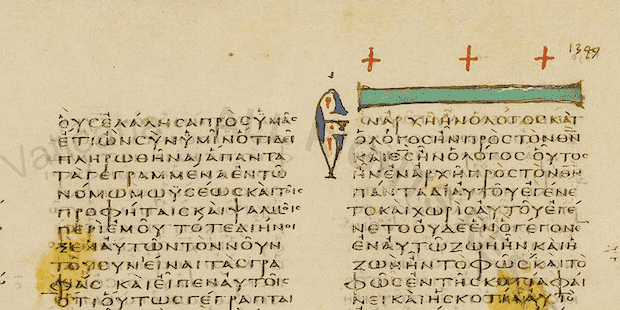
Should All Preachers be Going Deeper with New Testament Greek?
The new issue of  Credo Magazine has been recently released: Holiness. The following is an excerpt of Tyler’s Sykora book review, Should All Preachers Be Going Deeper with New Testament Greek? Tyler Sykora is a Master of Divinity student at Midwestern Baptist Theological Seminary. He is the research assistant to Dr. Jason K. Allen, president of MBTS, and a recruitment specialist in the Admissions office. He is also a resident in the Pastoral Training Center at Liberty Baptist Church with Jared Wilson.
Credo Magazine has been recently released: Holiness. The following is an excerpt of Tyler’s Sykora book review, Should All Preachers Be Going Deeper with New Testament Greek? Tyler Sykora is a Master of Divinity student at Midwestern Baptist Theological Seminary. He is the research assistant to Dr. Jason K. Allen, president of MBTS, and a recruitment specialist in the Admissions office. He is also a resident in the Pastoral Training Center at Liberty Baptist Church with Jared Wilson.
Many a young preacher or seminary student have asked, “Is learning Greek and Hebrew really necessary? Don’t we have reliable English translations after all?” While it is true that we have reliable English translations, it is still important for those desiring to preach God’s Word to learn the original languages. Neglecting to study the original languages, when they are so accessible, is akin to an astronomer settling to study pictures of the sky when a clear night and telescope are right outside his door.
Along these lines, Luther provocatively states, “It is a sin and shame not to know our own book or to understand the speech and words of our God; it is a still greater sin and loss that we do not study languages, especially in these days when God is offering and giving us men and books and every facility and inducement to this study, and desires his Bible to be an open book.”[1] What is more, we have far more resources at our fingertips than Luther did. Due to technological advances and numerous accessible publications, it is easier than ever to dive into the languages of Scripture.
One such recent publication is Going Deeper with New Testament Greek: An Intermediate Study of the Grammar and Syntax of the New Testament. Andreas Köstenberger, Benjamin Merkle, and Robert Plummer co-authored this intermediate grammar, published in 2016 by B&H Academic. The primary goal of the authors “was to produce an intermediate Greek text that could be manageably digested when a student reads through the material.”[2] Indeed, all one has to do is spend 15 minutes reading the advanced Greek grammar BDF to appreciate this goal.[3]
Going Deeper is divided into 15 chapters, which makes it ideal for the average 15-week seminary semester. The authors take a “middle of the road” approach when it comes to what they include and exclude from their text. If Dan Wallace’s grammar Beyond the Basics is more of an intermediate to advanced grammar, then Going Deeper is more of a beginner to intermediate grammar.[4] This makes it a perfect text for those just finishing their first year of Greek, or for those who let their Greek slip away but want to revive it.
Endnotes
[1] Luther, “To the Councilmen of Germany,” 364.
[2] Andreas J. Köstenberger, Benjamin L. Merkle, and Robert L. Plummer, Going Deeper with New Testament Greek: An Intermediate Study of the Grammar and Syntax of the New Testament(Nashville, Tennessee: B&H Academic, 2016), 2.
[3] Friedrich Blass, Albert Debrunner, and Robert Walter Funk, A Greek Grammar of the New Testament and Other Christian Literature: A Translation and Revision of the Ninth-Tenth German Ed. (Chicago: Univ., 1970).
[4] Daniel B Wallace, Greek Grammar Beyond the Basics: An Exegetical Syntax of the New Testament (Grand Rapids, Mich.: Zondervan, 2008).

